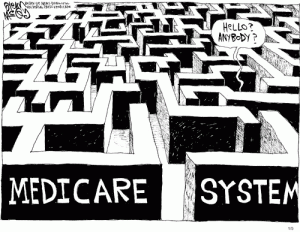The other day I was talking with Jacquie Brennan, Vice President, Marketing and Corporate Development for Vigil Health Solutions, a Senior Housing Forum partner. She said, “In the industry, I think we all agree that traditional emergency call systems – with pull strings or call cords – don’t work very well for residents who have dementia, right?
“Dementia care residents may forget what the pull cords are for and pull them when there’s no emergency. This sets off loud alarms that frighten and disturb other residents. And, if a resident doesn’t know to use the cord in an emergency, they are useless anyway. So why, in new communities or renovations are senior living developers continuing to put them in dementia care buildings or units?”
Familiar and Comfortable
She had me stumped for a couple of days until I was reading an article on marketing that said: “Your customers are drawn to the familiar.” That sentence jumped out at me. It struck me that it could be just that simple: Owners/Developers are continuing to install the traditional emergency call systems because that’s what they know and they’re comfortable with what they know.
They may not be aware of the range of new technologies that exist, including those offered by Vigil Health Solutions. Vigil’s award-winning dementia system summons help for residents when they no longer have the judgment or cognitive skills to work a conventional call system.
Vigil’s system uses intelligent software and passive sensors that continually monitor resident rooms for unexpected behavior – for example, agitation or restlessness, extended time in the bathroom, getting out of bed when they’re typically asleep, or leaving their room. When unanticipated conduct is detected that information is reported to appropriate caregivers via silent pager, wireless phone, or email enabled smart phones. Caregivers check in with residents to see what is going on.
There are no audible alarms or flashing lights, instead a calm homelike environment is maintained. Use of these unobtrusive systems for monitoring residents helps maintain their privacy while safeguarding their well being. And the data from the sensors is also directed to a central computer where all alarm activity, sensor activity, and summons are recorded for further analysis.
Vigil systems facilitate the highest standard of care, support risk management, and improve staffing efficiencies. Specific advantages of Vigil’s dementia system fall into three main categories as follows:
1. Marketing
- Use of sensor-based high tech distinguishes the care at your community from others in your service area
- Families can feel more comfortable with their placement decisions
- Residents may even be willing to pay more
2. Staffing
- Better able to get to residents faster if there is a problem
- Minimizes the need for excessive bed checks
- Can focus special attention on residents at-risk for falls
- There are fewer false calls
- Allows for quick follow up with families and medical professionals
3. Residents and Families
- The reduced bed checks lessen disturbance of residents
- High degree of privacy
- Reports generated allow for quick follow up with family and medical professionals
- Greater freedom of movement without staff supervision
Vigil’s solutions are scalable and adaptable, giving assisted living communities and nursing homes the freedom to customize the system to address their specific operations. It functions on an Integrated Care Management System Platform that includes desktop software and reports. Additionally, Vigil is also known for its high-level customer service, support, and training.
There’s just no reason for developers and owners not to become familiar with Vigil and other more recent emergency alert technologies. Visit www.vigil.com to view videos, case studies, and system demonstrations.
How do your dementia care residents notify staff of emergencies? What has your experience been with sensor-based systems?
Pam








